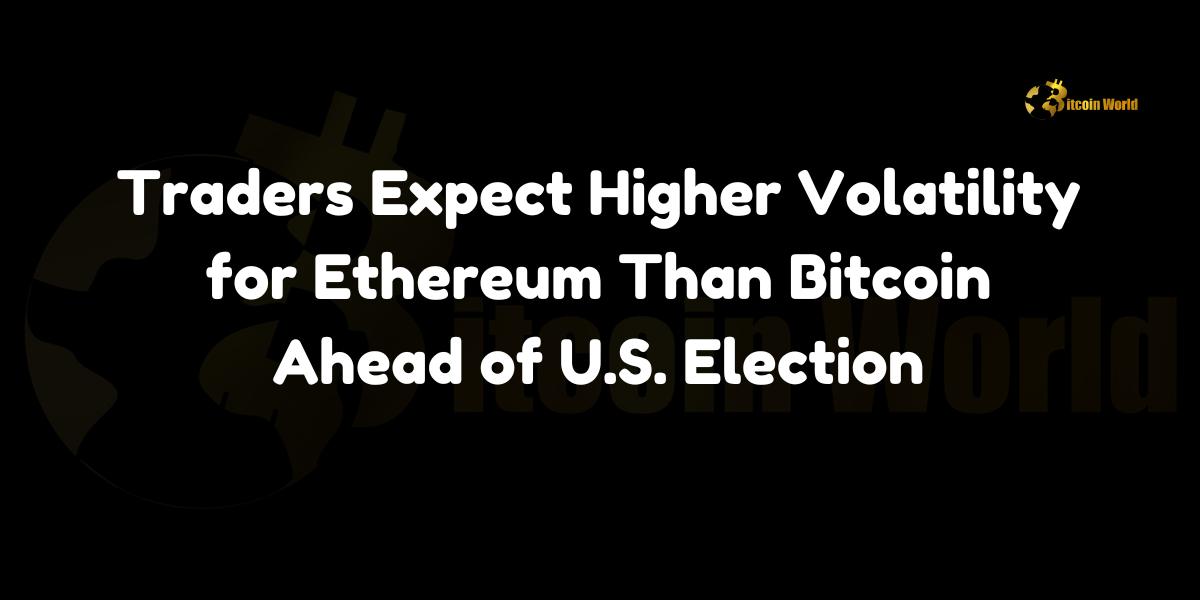Traders Expect Higher Volatility for Ethereum Than Bitcoin Ahead of U.S. Election
As the U.S. presidential election approaches, traders are bracing for heightened volatility in the Ethereum (ETH) market, with predictions of significant price swings between October 25 and November 8, 2024, according to a report by Cointelegraph. While Bitcoin (BTC) is expected to remain relatively stable due to its role as a digital store of value, Ethereum’s close ties to the decentralized finance (DeFi) sector and potential regulatory risks are causing traders to anticipate more dramatic price fluctuations.
Traders are forecasting potential ETH price movements ranging from -26% to +35%, with many viewing the upcoming U.S. election as a critical event that could impact ETH’s future and the broader cryptocurrency market.
Why Ethereum Faces Higher Volatility
According to Nick Forster, founder of the Derive options trading protocol within the Synthetix ecosystem, Ethereum’s heightened volatility compared to Bitcoin can be attributed to its deep integration with the DeFi ecosystem. Ethereum serves as the foundation for many DeFi platforms, decentralized applications (dApps), and smart contract protocols, making it more sensitive to political and regulatory developments that could arise from the U.S. election.
The potential for regulatory changes following the election is a key driver of the expected ETH volatility. Depending on the election’s outcome, new regulations could be introduced that either support or hinder the growth of DeFi and other crypto sectors that rely on Ethereum. These regulatory risks, combined with Ethereum’s role in DeFi, make it more susceptible to significant price movements during this period of uncertainty.
Ethereum’s Regulatory Risks and U.S. Election Impact
The outcome of the U.S. election is likely to influence the regulatory landscape for cryptocurrencies, particularly in the areas of decentralized finance and blockchain innovation. Some candidates have expressed concerns about the DeFi space, citing the potential for money laundering, fraud, and a lack of consumer protections. If new regulations are introduced targeting DeFi, Ethereum, as the primary platform for these services, could experience sharp price movements as investors react to potential restrictions.
At the same time, the election could bring about pro-crypto candidates or policies that support blockchain innovation and seek to create a more favorable regulatory environment. This scenario could lead to a significant rally for Ethereum, as traders and investors would view such developments as a positive indicator for the long-term growth of DeFi and the broader crypto ecosystem.
Bitcoin’s Stability Compared to Ethereum
While traders expect Ethereum to experience significant price swings, Bitcoin is predicted to remain more stable in the lead-up to the election. This difference in volatility is primarily due to Bitcoin’s status as a digital store of value and its more established role as a hedge against inflation and economic uncertainty.
Bitcoin has often been compared to digital gold, and its simpler use case as a store of value makes it less sensitive to regulatory changes or specific developments in sectors like DeFi. As a result, traders are expecting BTC to be less volatile during the election period, positioning it as a relatively safer asset compared to Ethereum.
Expected Price Swings for Ethereum Post-Election
According to market predictions, Ethereum could experience price swings of -26% to +35% following the U.S. election. These wide-ranging forecasts reflect the high level of uncertainty surrounding Ethereum’s short-term future, particularly as the market waits to see how the election results will impact regulation and policy related to cryptocurrencies.
The potential for a +35% rally suggests that traders believe Ethereum could benefit from a favorable regulatory environment, especially if policies supporting blockchain innovation and DeFi growth are implemented. On the other hand, a -26% decline could occur if regulatory actions targeting the DeFi sector introduce new restrictions or create uncertainty for Ethereum’s development.
Strategies for Traders and Investors
Given the expected volatility in the Ethereum market, traders are likely to adopt various strategies to navigate the uncertain landscape. Options trading, particularly through platforms like Derive, has emerged as a popular way for traders to hedge against potential price swings or capitalize on price movements in either direction.
Investors with long-term outlooks may also take advantage of price dips to accumulate Ethereum at lower prices, especially if they believe that DeFi and smart contract platforms will continue to grow despite any short-term regulatory challenges. Conversely, more risk-averse investors might prefer to shift their focus to Bitcoin or other stable assets to mitigate the impact of potential volatility.
Conclusion
With the U.S. election fast approaching, traders are expecting Ethereum to experience greater volatility than Bitcoin, largely due to its connections to the DeFi sector and the potential regulatory risks that may arise from the election’s outcome. While Bitcoin is expected to remain relatively stable, Ethereum could see price swings between -26% to +35% in the weeks following the election.
As traders and investors prepare for this period of uncertainty, Ethereum’s volatility will be a key factor to watch, with the election results potentially shaping the future of DeFi and the broader cryptocurrency ecosystem.
To learn more about the innovative startups shaping the future of the crypto industry, explore our article on latest news, where we delve into the most promising ventures and their potential to disrupt traditional industries.
Disclaimer: The information provided is not trading advice, Bitcoinworld.co.in holds no liability for any investments made based on the information provided on this page. We strongly recommend independent research and/or consultation with a qualified professional before making any investment decisions.




